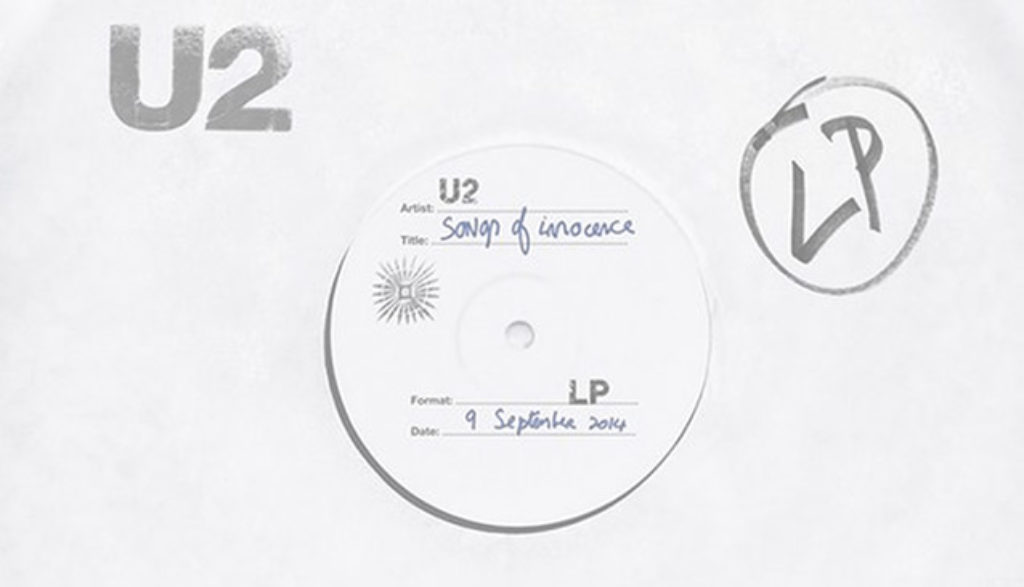
You never know what Bono might do next.
Like, maybe, turn up with his impossibly cool bandmates at the unveiling of Apple’s latest techno-gizmos and announce U2’s 13th studio album, Songs of Innocence. After the iconic band performed one of their new tracks live, Apple CEO Tim Cook asked, “Wasn’t that the most incredible single you ever heard? We would love a whole album of that.”
Bono played along: “The question is now, how do we get it to as many people as possible, because that’s what our band is all about. I do believe you have over half a billion subscribers to iTunes, so … could you get this to them?”
“If we gave it away for free,” Cook responded gamely.
And so, just like that, roughly 500 million music lovers in 119 countries had immediate access to U2’s brand-new album, easily the biggest splash-down in the history of music.
The songs on Songs of Innocence draw inspiration from U2’s punk rock heroes of the late 1970s, the Ramones and The Clash. They also delve into deeply personal memories Bono and Co. have from that late adolescent season of their lives. “We wanted to make a very personal album,” Bono told Rolling Stone’s Gus Werner. “Let’s try to figure out why we wanted to be in a band, the relationships around the band, our friendships, our lovers, our family. The whole album is first journeys—first journeys geographically, spiritually, sexually. And that’s hard. But we went there.”
“The Miracle (of Joey Ramone)” hints at redemption and gratitude, while “Every Breaking Wave” (which sounds a bit like classic Bruce Springsteen) probes the tension between longing for eternity and the reality that our lives are finite (“Every breaking wave on the shore/Tells the next one there’ll be something more/ … Are we ready to be swept off our feet/And stop chasing/Every breaking wave?”). “California (There Is No End to Love)” juxtaposes the power of love (“And all I need to know is there is, yeah there is no end to love”) against the threat of loss (“I’ve seen for myself/There’s no end to grief”).
Beach Boys-esque “Iris (Hold Me Close)” is an anthem of remembrance for Bono’s mother. “Cedarwood Road” fondly recalls childhood friendship on the street where Bono grew up. He contrasts growing up scared with the sheltering refuge of friendship (“Then I ran in to you/… And friendship, once it’s won/It’s won, it’s one”). The song ends with the spiritual musing, “A heart that is broken/Is a heart that is open.’ “Volcano” admits to volatile emotions while acknowledging that sometimes we need to relinquish past hurts (“You can hurt yourself tryin’ to hold on/To what you used to be”). Near the end, the song repeats, “You were alone/Now you’re not alone.”
“Sleep Like a Baby Tonight” takes a hardhearted man to task for his callous indifference to others’ suffering. “The Troubles” repudiates soul-sapping influences.
Bono hints on “Raised by Wolves” that his difficult adolescence made him stronger, fiercer (“Raised by wolves/Stronger than fear”). But it should be noted that the track is both grim and pointed (“Blood in the house/Blood on the street”) as it laments that “The worst things in the world are justified by belief.” It goes so far as to intimate that if atrocities like “33 good people cut down” come from a spiritual place, then “I don’t believe anymore …”
Of course that last line needs a lot of context that most listeners won’t have.
“Volcano” describes rock music’s influence as a kind of spiritual communion: “You were alone/But now/You are rock ‘n’ roll/You and I are rock ‘n’ roll.” Likewise, the album’s tacit endorsement of sometimes problematic bands like the Ramones and The Clash is never tempered.
Songs of Innocence is certainly personal. Maybe it’s so personal the rest of us will never really know what it’s all about. Take “Song for Someone” as an example: It seems Bono is praising someone (who may or may not be his wife, Ali, whom he met when he was 13 and she was 12) on lines like, “You let me into a conversation/A conversation only we could make.” Then we get vignettes that may or may not be about sex (“I was told that I would feel nothing the first time”) or spiritual beliefs (“And I’m a long, long way from your hill of Calvary”). Occluded by poetic obliquity, there are many moments that feel quite memorable here … but never quite tell us what we’re supposed to be remembering.
Bono, of course, knows exactly what he’s been through. And in some cases, he’s shared the rest of the story. That elusive context for “Raised by Wolves”? He told Rolling Stone that it’s about a terrorist car bombing that very nearly claimed his life: “It was a real incident that happened in our country where three car bombs were set to go off at the same time in Dublin on a Friday night, 5:30. On any other Friday I would have been at this record shop, just down the corner, but I cycled to school that day.”
Thankfully, Bono and his famous band’s long-held perspective on life still comes through in a way everyone can understand, namely that love, faith and friendship give us what we need to triumph over life’s inevitable losses. Perhaps nowhere does Bono deliver that message more eloquently than in the final lines of the final song, “The Troubles”: “God knows it’s not easy/Taking on the shape of someone else’s pain/God, now You can see me/I’m naked and I’m not afraid/My body’s sacred, and I’m not ashamed.”


After serving as an associate editor at NavPress’ Discipleship Journal and consulting editor for Current Thoughts and Trends, Adam now oversees the editing and publishing of Plugged In’s reviews as the site’s director. He and his wife, Jennifer, have three children. In their free time, the Holzes enjoy playing games, a variety of musical instruments, swimming and … watching movies.